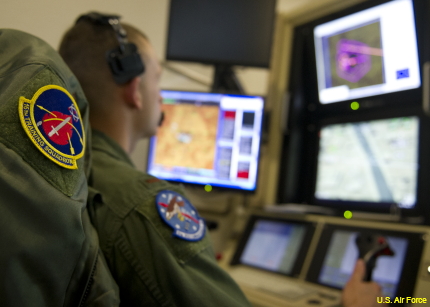Air Force adopts softer touch toward exhausted drone pilots
The month-long Culture and Process Improvement Program aims to improve quality of life and conditions for Predator and Reaper pilots.

MQ-9 Reaper pilots are being overtaxed.
The Culture and Process Improvement Program got started last month at Joint Base Langley-Eustis and will take place this month at a dozen bases around the country, according to an Air Force release.
The Air Force has been pretty forthcoming about its struggles to retain airmen for its unmanned fleet. Since the first unmanned sorties were flown nearly 20 years ago, the military has significantly increased the fleet, heavily relying on daily surveillance operations for intelligence. The seemingly unrelenting militants based mostly in the Middle East and North Africa, along with the rebalance to the Asia/Pacific region, has severely strained the current unmanned aircraft force.
The CPIP announcement follows fixes the Air Force announced earlier this year aimed at not only recruiting for the unmanned fleet, but retaining airmen, who have typically left for other job assignments at a rate higher than conventional pilots. Among fixes recently announced, the Air Force will provide bonuses of $15,000 per year beginning in fiscal 2016 for airmen, and it will draw exclusively from the undergraduate pilot training pipeline for one year to alleviate the pressure on “overtaxed” crews. The service also has committed over $100 million for additional ground stations, simulators and contract instructors, although that figure is still pending congressional approval.
The Air Force currently flies 60 daily combat air patrols (CAPs) – which typically consist of four aircraft and enable the force to rotate aircraft into the sky for constant 24/7 monitoring of a particular area – down from 65 a year ago—despite the desire for more given what some military leaders have called, “the most dangerous time," in a generation.
Throughout September, the CPIP, which will take place at 12 Air Force active-duty, Reserve and National Guard bases, will send teams to engage with airmen and their families and build upon information from over 3,000 surveys that identified concerns with the MQ-1/9 community, the release stated.
“We're seeing problems in the MQ-1/9 community at both the major command and base levels that can be solved quickly,” said Col. Troy Jackson, the command and control intelligence, surveillance and reconnaissance operations division chief and CPIP officer in charge. “Airmen in this career field are being exhausted with no end in sight; we want to fix this.”
“We're asking airmen to do a lot when they're either not trained properly or not ready for what's being asked of them, which leaves the airmen burned out,” Jackson added.
Unmanned aircraft have been an invaluable resource to the force as a whole, and top military leaders want to ensure they can maintain the personnel to keep the status quo – and even continue to expand it. The ilitary is planning a 50 percent increase in CAPs by 2019, by using Army, Special Operations and contractor crews for some of the patrols, which to date have been handled almost excleusively by the Air Force. “We want to provide the MQ-1/9 community the same level of holistic quality of life and professional development as other weapon systems, and this is a step toward it,” Jackson said.
The program will seek to focus on smaller problems that can be ameliorated quickly while taking a deeper dive into longer-term strategic goals that will improve more complex and “deep-seeded” problems of airmen through the process.
The bases scheduled for visits include:
- Creech Air Force Base, Nevada, Sept. 9-11
- March Air Reserve Base, California, Sept. 13
- Davis-Monthan AFB, Arizona, Sept. 13
- Holloman AFB, New Mexico, Sept. 15-16
- Ellington Field Joint Reserve Base, Texas, Sept. 15
- Whiteman AFB, Missouri, Sept. 17
- Cannon AFB, New Mexico, Sept. 18-19
- Berry Field Air National Guard Base, Tennessee, Sept. 19
- Ellsworth AFB, South Dakota, Sept. 21
- Springfield Municipal Airport, Ohio, Sept. 21
- Fargo ANGB, North Dakota, Sept. 23
- Hancock Field ANGB, New York, Sept. 23.
NEXT STORY: Air Force looks to boost its EW capabilities



